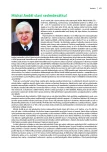Is glucosis only basic energy substrate?
Authors:
Luboš Sobotka
Authors‘ workplace:
III. interní gerontolometabolická klinika LF UK a FN Hradec Králové
Published in:
Vnitř Lék 2016; 62(Suppl 4): 100-102
Category:
Reviews
Overview
At present time glucose is primarily considered as basic energy substrate. Therefore, it is recommended to give amount of glucose which is necessary for oxidation and energy production. As critical illness is connected with so-called insulin resistance, it is recommended to reduce the glucose dose and maintain normal blood glucose. Glucose, however, may not only be the principal energy substrate but also the substrate necessary for many metabolic reactions, which are essential for normal reactivity and survival.
Key words:
energy – glucose – glucose requirement – glucose turnover
Sources
1. Singer P, Berger MM, Van den Berghe G et al. ESPEN Guidelines on Parenteral Nutrition: intensive care. Clin Nutr 2009; 28(4): 387–400. Dostupné z DOI: <http://dx.doi.org/10.1016/j.clnu.2009.04.02>.
2. Van den Berghe G, Wouters P, Weekers F et al. Intensive insulin therapy in the critically ill patients. N Eng J Med 2001; 345(19): 1359–1367.
3. Van den Berghe G, Wilmer A, Hermans G et al. Intensive insulin therapy in the medical ICU. New Engl J Med 2006; 354(5): 449–461.
4. Finfer S, Heritier S. [NICE Study Management Committee and SUGAR Study Executive Committee]. The NICE-SUGAR (Normoglycaemia in Intensive Care Evaluation and Survival Using Glucose Algorithm Regulation) Study: statistical analysis plan. Crit Care Resusc 2009; 11(1): 46–57.
5. Preiser JC, Devos P, Ruiz-Santana S et al. A prospective randomised multi-centre controlled trial on tight glucose control by intensive insulin therapy in adult intensive care units: the Glucontrol study. Intensive Care Med 2009; 35(10): 1738–1748.
6. Rusavy Z, Sramek V, Lacigova S et al. Influence of insulin on glucose metabolism and energy expenditure in septic patients. Crit Care 2004; 8(4): R213-R220.
7. Rusavy Z, Macdonald IA, Sramek V et al. Glycemia influences on glucose metabolism in sepsis during hyperinsulinemic clamp. JPEN J Parenter Enteral Nutr 2005; 29(3): 171–175.
8. Champagne CD, Houser DS, Crocker DE. Glucose production and substrate cycle activity in a fasting adapted animal, the northern elephant seal. J Exp Biol 2005; 208(pt 5): 859–868.
9. Soeters MR, Soeters PB. The evolutionary benefit of insulin resistance. Clin Nutr 2012; 31(6): 1002–1007.
10. Agwunobi AO, Reid C, Maycock P et al. Insulin resistance and substrate utilization in human endotoxemia. J Clin Endocrinol Metab 2000; 85(10): 3770–3778.
11. Brealey D, Singer M. Hyperglycemia in critical illness: a review. J Diabetes Sci Technol 2009; 3(6): 1250–1260.
12. Ralser M, Wamelink MM, Kowald A et al. Dynamic rerouting of the carbohydrate flux is key to counteracting oxidative stress. J Biol 2007; 6(4): 10.
Labels
Diabetology Endocrinology Internal medicineArticle was published in
Internal Medicine

2016 Issue Suppl 4
-
All articles in this issue
- Adaptation of adipose tissue to weight-reduction energy-restricted diet in obese individuals
- Heterogeneity of childhood diabetes and its therapeutic implications
- History of diagnosis and therapy of diabetic retinopathy
- Metabolic syndrome in patients with diabetes mellitus type 1, prevalence, impact on morbidity and mortality
- Frequency and timing of meals and changes in body mass index: Analysis of the data from the Adventist Health Study-2
- Education of a patient with diabetes – an integral part of complex therapy
- Pregestional diabetes mellitus and pregnancy
- Bariatric surgeries at diabetic patients
- Mind as an immunomodulator
- Diabetic foot syndrome from the perspective of internist educated in podiatry
- OxLDL/β2-glycoprotein I complex as a pro-atherogenic autoantigen. Is atherosclerosis an autoimmune disease?
- Gestational Diabetes Mellitus
- Growth hormone, axis GH-IGF1 and glucose metabolism
- Promising molecules for treatment of hyperglycemia in patients with type 2 diabetes
- Congenital hyperinsulinism: Loss of B-cell self-control
- Obstructive sleep apnoea and type 2 diabetes mellitus
- Short-term and long-term glycemic variability and its relationship to microvascular complications of diabetes
- Composition of macronutrients in the diabetic diet
- Is glucosis only basic energy substrate?
- Actual trends in diagnostics and treatment of congenital hyperinsulinism
- Should we consider a new classification of diabetes influenced by therapeutic decisions?
- Diabetes mellitus in older adults from the point of view of the clinical diabetologist
- Internal Medicine
- Journal archive
- Current issue
- Online only
- About the journal
Most read in this issue
- Congenital hyperinsulinism: Loss of B-cell self-control
- Gestational Diabetes Mellitus
- Growth hormone, axis GH-IGF1 and glucose metabolism
- Education of a patient with diabetes – an integral part of complex therapy
